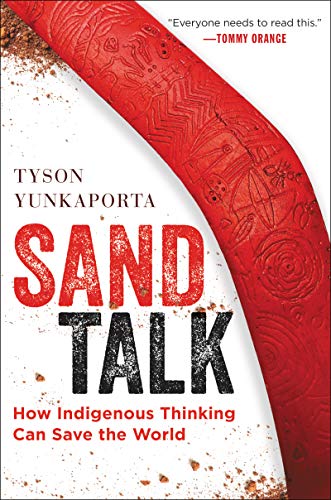This week I wanted to share Sand Talk, a book by Tyson Yunkaporta. Yunkaporta is an Aboriginal scholar. His work applies Indigenous inquiry methods to resolve complex issues and explore global crises.
This book is different because it ” examines global systems from an Indigenous Knowledge perspective.”
This book opened my eyes to a different way of seeing that was very well aligned with the books on complexity I have been studying. In business, we are often locked into a linear series of outcomes (do X to get Y), and we miss that activities like managing people are complex and non-linear.
For Yunkaporta, thinking linearly was more difficult
We don’t have a word for non-linear in our language because nobody would consider traveling, thinking, or talking in a straight line in the first place. The winding path is just how a path is.”
When straight lines connecting points with clear cause and effect drop away, it becomes clear how everything is naturally and deeply entangled. And one large theme of the book is how things are interconnected and to see the patterns and our role as part of the system.
Look beyond the things and focus on the connections between then…look beyond the connections and see the patterns they make. Find the sites of potential risk and increase…In Aboriginal worldviews, nothing exists outside of a relationship to something else.”
It is difficult to relinquish the illusions of power and delusions of exceptionalism that come with privilege. But it is strangely liberating to realize your true status as a single node in a cooperative network.
To operate in a connected way, Yunkaporta shares 4 rules or protocols:
- Diversity: “Diversity protocol has three parts—similar to you, different from you, and systems beyond you. It compels you to maintain your individual differences, particularly from those other agents that are similar to you. You must also seek out and interact with a wide variety of agents that are completely dissimilar to you. Finally, you must interact with other systems beyond your own, keeping your system open and therefore sustainable.”
- Connect: “Connectedness involves forming pairs with multiple other agents who also pair with others. The next step is creating or expanding networks of these connections. The final step is making sure these networks are interacting with the networks of other agents, both within your system and in others.”
- Interact: “The interaction protocol is about continuously transferring knowledge, energy, and resources. This means passing on these three things to as many other agents as possible, rather than trying to store them individually.”
- Adapt: “Adaptation is the most important protocol of an agent in a sustainable system…The adaptation protocol is about transformation, feedback loops, and strange attractors. You must allow yourself to be transformed through your interactions with other agents.”
There is a final set of tools that describes how to go about creating knowledge, and I think it can be very useful when applied to forming teams or starting projects: Respect, Connect, Reflect, Direct.
- “The first step of Respect is aligned with values and protocols of introduction, setting rules and boundaries.”
- “The second step, Connect, is about establishing strong relationships and routines of exchange that are equal for all involved.”
- “The third step, Reflect, is about thinking as part of the group and collectively establishing a shared body of knowledge to inform what you will do.”
- “The final step, Direct, is about acting on that shared knowledge in ways that are negotiated by all.”
I will close with two final quotes from the book that resonated with me.
The war between good and evil is in reality an imposition of stupidity and simplicity over wisdom and complexity.
Everything in creation is sentient and carries knowledge therefore everything is deserving of your respect.

